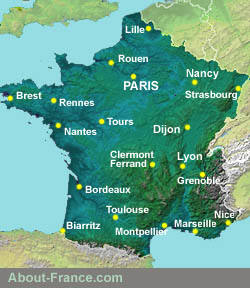- Explore France ►
- Essential pages
- Travel in France
- Where to go
- What to see and do
French grammar - articles
Definite and indefinite articles in French
| Page Index : | The definite article | The indefinite article | Omission of the article |
► Articles belong to the
family of "determiners" or "pre-determiners"
1. The definite article
French
has three
forms of the definite article corresponding to the English article
"the".
They are Le, La and Les. There is also the singular l' used before vowels
Usage depends on the gender and number (singular, plural) of the noun.
Le is used with singular masculine nouns.
Usage:
Use of the definite article in French is not always the same as use of the definite article in English.
In simple defining contexts, usage is similar.
However, there are some difficulties to be mastered .......
However French is changing, and a growing number of personal nouns are being used in both masculine and feminine forms. Usually a specific feminine form is used, as in le président / la présidente ; but in some cases identical forms are found, as in un professeur / une professeur (or une professeure) or un / une médecin ( a doctor). In this last case, one cannot say Une médecine, as that would mean a medicine, not a lady doctor.
Difficulty! Articles with plural count nouns in French
There are two ways of using count nouns (nouns refering to items that can be counted) in the plural: a generalising use (i.e. all the items) and a restrictive use (i.e. some of the items)
When count-nouns are used in a generalising context in the plural, English indicates this generalisation by omitting the article; French marks it by using the definite article.
but
She has (some) children : elle a des enfants
The above examples show that the dividing line between the concepts of "generalisation" and "restriction" is not quite the same in French and English.
Difficulty! Article usage with singular non-count nouns in French
In French, it is not normally possible to use a noun without a predeterminer of one sort or another. Thus singular non-count-nouns which do not need an article or determiner in English normally require one in French.
They are Le, La and Les. There is also the singular l' used before vowels
Usage depends on the gender and number (singular, plural) of the noun.
Le is used with singular masculine nouns.
Le
garcon, le train, le problème, le président, etc.
La
is
used with singular feminine nounsLa
fille, la dame, la voiture, la difficulté, la maison
Les is
used with plural nouns, whatever gender they may beLes
garçons, les filles, les personnes, les choses, les
difficultés, etc.
L' is
used in the singular before vowels, irrespective of genderL'enfant,
l'ami, l'amie, l'université, l'option, l'iris
Usage:
Use of the definite article in French is not always the same as use of the definite article in English.
In simple defining contexts, usage is similar.
Examples:
The car is in the street - La voiture est dans la rue
The first is the best - Le premier est le meilleur
The car is in the street - La voiture est dans la rue
The first is the best - Le premier est le meilleur
However, there are some difficulties to be mastered .......
Difficulty ! Articles, gender and sex
Choice of article depends on the gender of the noun, not necessarily on the sex of the person (or object!) Thus we have to say une personne, or une vedette (a star) even if referring to a man, as these nouns are feminine. Many bits of machinery are feminine nouns, thus une locomotive. Consequently, any pronouns that refer back to a noun will (in grammatical French at least) reflect the gender of the noun, not necessarily the sex of the person (though in most cases nouns that denote females are also feminine nouns, so no problem)Examples:
I saw three people; they were getting into a car : J'ai vu trois personnes; elles montaient dans une voiture.
On doit avoir une vedette pour le concert; elle attirera plus de monde: We need to get a star for the concert; they'll bring in more people
I saw three people; they were getting into a car : J'ai vu trois personnes; elles montaient dans une voiture.
On doit avoir une vedette pour le concert; elle attirera plus de monde: We need to get a star for the concert; they'll bring in more people
However French is changing, and a growing number of personal nouns are being used in both masculine and feminine forms. Usually a specific feminine form is used, as in le président / la présidente ; but in some cases identical forms are found, as in un professeur / une professeur (or une professeure) or un / une médecin ( a doctor). In this last case, one cannot say Une médecine, as that would mean a medicine, not a lady doctor.
Difficulty! Articles with plural count nouns in French
There are two ways of using count nouns (nouns refering to items that can be counted) in the plural: a generalising use (i.e. all the items) and a restrictive use (i.e. some of the items)
When count-nouns are used in a generalising context in the plural, English indicates this generalisation by omitting the article; French marks it by using the definite article.
Examples:
I like cakes : J'aime les gâteaux.
Children often make a lot of noise: Les enfants font souvent beaucoup de bruit.
I like cakes : J'aime les gâteaux.
Children often make a lot of noise: Les enfants font souvent beaucoup de bruit.
Thus a plural count noun preceded by a definite article generalises, a plural count-noun preceded by an indefinite article is restrictive.
Children like sweets : les enfants aiment les bonbonsbut
She has (some) children : elle a des enfants
The above examples show that the dividing line between the concepts of "generalisation" and "restriction" is not quite the same in French and English.
Difficulty! Article usage with singular non-count nouns in French
In French, it is not normally possible to use a noun without a predeterminer of one sort or another. Thus singular non-count-nouns which do not need an article or determiner in English normally require one in French.
Examples:
Water is necessary for life : l'eau est nécessaire pour la vie
He's studying philosophy : Il étudie la philosophie
French is a living language : Le français est une langue vivante.
Water is necessary for life : l'eau est nécessaire pour la vie
He's studying philosophy : Il étudie la philosophie
French is a living language : Le français est une langue vivante.
2. The indefinite article
French has
three forms of the indefinite article corresponding to the English
articles "a / an" and "some".
They are Un, une and des.
In addition, there are partitive articles used in the singular with non-count nouns:
They are: du, de la and de l'
Usage depends on the gender and number (singular, plural) of the noun.
Un is used with singular masculine nouns.
They are Un, une and des.
In addition, there are partitive articles used in the singular with non-count nouns:
They are: du, de la and de l'
Usage depends on the gender and number (singular, plural) of the noun.
Un is used with singular masculine nouns.
Un
garcon, un train, un problème, un président, un
ami etc.
Une is
used with singular feminine nouns
Une
fille, une dame, une voiture, une difficulté, une maison
Des
is used with plural nouns, whatever gender they may be
Des
garçons, des filles, des personnes, des choses, des
difficultés, etc.
The
partitive forms are used in the singular
Du
café, de la bière, de l'eau
Examples:
There's a man in the cupboard : Il y a un homme dans le placard
There's a fly in my soup : il y a une mouche dans ma soupe
I've got a good idea : J'ai une bonne idée
I need a chair to sit on : j'ai besoin d'une chaise pour m'asseoir
The photo shows a lavender field. La photo montre un champ de lavande
There are (some) people in the street : il y a des gens dans la rue.
There's (some) coffee or (some) beer ; il y a du café ou de la bière
There's a man in the cupboard : Il y a un homme dans le placard
There's a fly in my soup : il y a une mouche dans ma soupe
I've got a good idea : J'ai une bonne idée
I need a chair to sit on : j'ai besoin d'une chaise pour m'asseoir
The photo shows a lavender field. La photo montre un champ de lavande
There are (some) people in the street : il y a des gens dans la rue.
There's (some) coffee or (some) beer ; il y a du café ou de la bière
3. Omission of the article
► In some fixed expressions, singular nouns can be used without an article. But note that this is exceptional.► The article is normally omitted when indicating a person's job.
► The article is omitted after quantifiers like quelques, plusieurs
► It is also normally omitted in generalising cases after de: this includes cases following quantifiers such as beaucoup de (lots of), peu de (few), trop de (too much / many), etc. For example one would not normally say beaucoup du .
Examples:
I'm
frightened / J'ai
peur
I'm hungry / j'ai faim
I'm working at home : Je travaille à domicile . (or ... à la maison)
I need some sleep / J'ai besoin de sommeil
The man over there's a doctor / L'homme là-bas est médecin
He's a company director / Il est chef d'entreprise
It's a real masterpiece / C'est un vrai chef d'oeuvre
I've got several good friends / J'ai plusieurs bons amis
There's lots of water in the river / Il y a beaucoup d'eau dans la rivière.
There's too much sugar in this tea. / Il y a trop de sucre dans ce thé.
There are too many people here. / Il y a trop de personnes ici.
I'm hungry / j'ai faim
I'm working at home : Je travaille à domicile . (or ... à la maison)
I need some sleep / J'ai besoin de sommeil
The man over there's a doctor / L'homme là-bas est médecin
He's a company director / Il est chef d'entreprise
It's a real masterpiece / C'est un vrai chef d'oeuvre
I've got several good friends / J'ai plusieurs bons amis
There's lots of water in the river / Il y a beaucoup d'eau dans la rivière.
There's too much sugar in this tea. / Il y a trop de sucre dans ce thé.
There are too many people here. / Il y a trop de personnes ici.
| Return to French grammar pages : index | Study or learn French in France | Essential French words and phrases for travellers |




